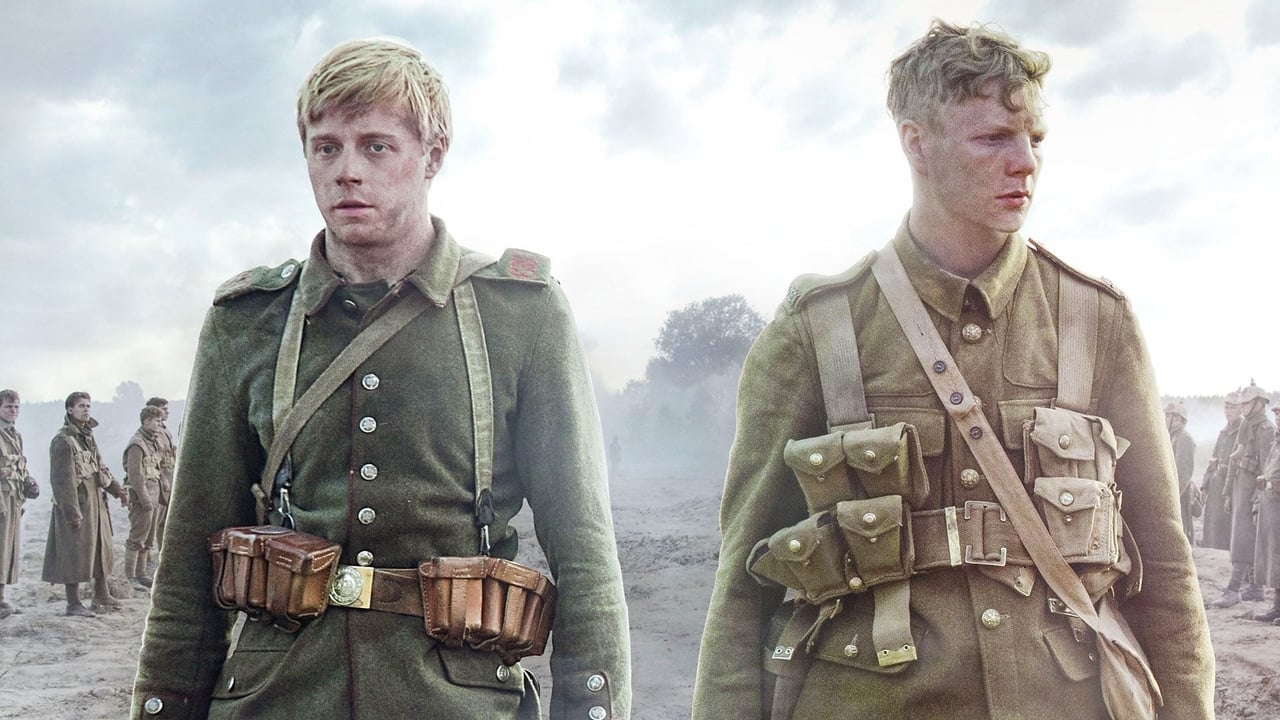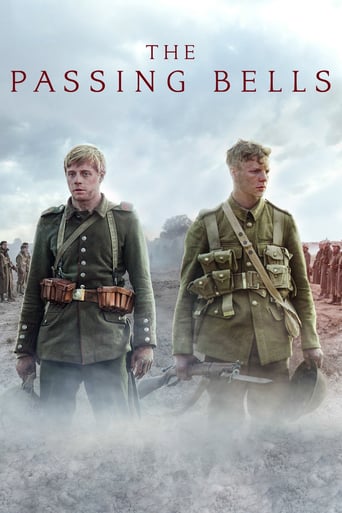

Self-important, over-dramatic, uninspired.
... View MoreIntense, gripping, stylish and poignant
... View MoreMostly, the movie is committed to the value of a good time.
... View MoreThrough painfully honest and emotional moments, the movie becomes irresistibly relatable
... View MoreIf your history of WWI was primarily from this TV show you'd probably believe that all the soldiers were 16-17 years old, widely engaged in premarital sex, and that the wars were fought almost exclusively in trenches, including right up to the very end. These are all things that yes, they did happen, but were rare, or happened at points and places in the war very different from that portrayed on-screen. At first I was concerned that the 30 minute format wouldn't allow them to tell the complex nuanced stories that were the reality of the war. By the end I was glad the stories were only 30 minutes long because they were having difficulty filling the time with anything not a blatant trope.Even if you ignore the history there's some serious structural problems. The German soldier's girlfriend/wife is a major character in the first few episodes before entirely disappearing. All of his home front scenes are about his parents and the wife appears only occasionally as a picture. Seems a little off.Also, you might recall that the french were a major player in WWI. Something that is sort of overlooked considering that there are almost no french characters, no french scenery, and really, that the western front is located across hundreds of miles of France is barely mentioned. Here's another specific inaccuracy: During early war when the first British reinforcements with our new recruit are deploying in the aftermath of the Marne they march through fields full of poppies. Fair enough, right? Poppies are the anglophile world's key floral symbol of The Great War. Except that after the Marne was September-October 1914 and Poppies bloom in the spring and early summer. They just didn't care.There is nothing in this show that has not been done better, elsewhere. What there is, is weak or remarkable for its inaccuracies.
... View MoreI thought this was a good drama and am a little bit baffled as to why some people needed to see blood and guts to be entertained or convinced.Anyone who has studied or read about the history of WW1 would already understand about the horrors of trench life and going over the top into battle.The viewer doesn't need to be hit over the head with blood and gory details we can leave that to the imagination and besides too much graphic details would only detract away from the dialogue of this drama as this story relies mainly on its script of what the soldiers are saying{their thoughts aloud}and thinking.And i think it was awesome. Of course there is a lot we are not shown such as the grounds in the trenches were always muddy and fall of rats and body parts from dead soldiers used to prop or hang things from etc the list is endless of how things really were but then WW1 was always censored our government kept quiet for decades until the 1980s about the amount of soldiers whose bodies were still being found by farmers in France and Belgium,sometimes as many as a hundred a year.And also so many people were totally unaware of how many of our soldiers were cruelly shot at dawn or if they had even knew in the first place. I thought this was a nice tribute to the men who served and put the point across that it was the war that was evil and not the men who served.I think this drama is good for educating the younger generation who might not know much about WW1 as it portrays how misled the men back then were and how underage boys got sucked in on having to do their bit.Very tragic and its what this drama does well. The film Oh What A Lovely War was a British musical about WW1 this also didn't show blood and guts as everything was said in the dialogue in what the actors were saying.Passing Bells has used the same idea.
... View MoreOverall I found this a bit disappointing and not helped by the time it was shown as it couldn't be more graphic.It tells the story of 2 men from either side fighting in WW1. The acting was very good I thought and the attention to detail was fine. However, I found it difficult to get really involved as it seemed to jump a bit between both sides.The ending was particularly disappointing and I thought contrived with both of the main characters meeting in no mans land while trying to repair damaged barbed wire. The fact that they then end up fighting and killing each other minutes before the war ends was a bit gimmicky and predictable.So overall not the greatest although it did convey how awful it must have been to fight in the war as well as the despair of seeing so many friends die. Spoiled by the contrived and quite predictable ending I thought.
... View MoreIt is nice to see a series about World War One for a change as it is a subject that isn't covered all that often, at least compared to other conflicts.Unfortunately however my main gripe with this series is that it's clearly intended for a pre-watershed audience. People die from nonspecific wounds, no one has any blood on them, no one swears and curses at their impending deaths...It's not that I want to see limbs flying off after shell impacts and people dripping with blood to slake some sick desire for gore but this was the reality of the conflict. It was horrific. Dumbing it down for the sake of censorship strikes me as being kind of offensive. It fails to get across just how awful the situation was for those involved in it and ultimately makes the viewer feel disconnected from the events on screen. Why show it at all if you are not going to show it right? For example seeing people getting cut down by a machine gun would be horrific. Seeing people falling over without scratch on them after some vague bang bang noises off camera just doesn't quite have the same impact. They might as well just be firing paintballs at the rows of approaching enemies.I've been watching it on iPlayer and it was only because the next episode just showed up online that I realised it was in a 7pm broadcast slot. It seems pretty obtuse to me that you can happily show hundreds of people dying in this time slot but not show a single person physically getting shot. It paints a completely false picture of events and almost seems to glorify the conflict as one big game rather than a serious event.If we want people to look back and remember the lessons of the past then they shouldn't be half-lessons which haze over anything deemed unsavoury.Earlier in the year The Crimson Field was shown on the BBC. It wasn't focused on the battlefield but did not shy away from the true terror of warfare. After the battles had ended and the gunfire had died down it showed the aftermath of events. The Passing Bells does this too at the Somme but despite trying to be all sombre and dramatic it simply fails because not a single soldier has so much as a drop of blood on them or even a bullet hole in their clothing. It seems that there is something seriously wrong when The Crimson Field only showed people being brought in on stretchers after the battle and yet managed to paint a more terrifying picture of what had happened than when this series actually tried to show it happening.This unrealistic disconnection from events as they happened makes me question why they even bothered to film a series so heavily focused on battle action. The series has more than enough human drama that it could have just filled it with this instead. Showing battle scenes in anything other than full realism just isn't really going to work these days when multimillion blockbuster films are out there, so why bother? Also each episode seems to cover one year of the conflict and frankly half an hour just isn't enough to get through all the stuff it is trying to cover. There is little character development as a result and soldiers go from being green recruits to battle hardened veterans in the blink of an eye.The first episode made me think that it might touch on some of the lesser known stories from the war. For instance I didn't know about the British making homemade bombs due to a supply shortage. Unfortunately it just sort of jumps from place to place after that in a really disconnected fashion.In short the series would have benefited from a later time slot and one hour episodes.
... View More